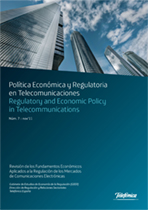Telefónica Public Policy & Telefónica España Regulatory teams
 On december 12th the new issue of “Regulatory and Economic Policy in Telecommunications”, the Regulatory Journal of Telefónica, was presented in District Telefónica, and as usual a workshop was held where contributors had a chance to present their articles and debate, this time around the theme “Reviewing the Economic Foundations of Regulation in ICT markets”.
On december 12th the new issue of “Regulatory and Economic Policy in Telecommunications”, the Regulatory Journal of Telefónica, was presented in District Telefónica, and as usual a workshop was held where contributors had a chance to present their articles and debate, this time around the theme “Reviewing the Economic Foundations of Regulation in ICT markets”.
Throughout the debate it became clear that Regulators, confronted with a growing concern that the current European regulatory model might be hindering private investment and innovation in broadband coverage and applications, must adapt their strategy to a new environment, and device incentive schemes that are not easily compatible with their overarching goal, which arguably remains preserving a very large number of alternatives for end users.
Last April, commenting on the previous issue of the journal, I concluded a post in this blog wondering why telecom policy makers seemed to be exempt from questioning their principles and strategies, while regulated telecom operators are undergoing a difficult process of self search and reform trying to respond to the challenges of lower revenues and competition from OTT services.
Are things changing?
One could be tempted to think they are, looking at the debate on the impact of regulation on the incentives to invest in Next Generation Networks.
However, it seems to me that Regulators are acting strictly out of fear that the self-imposed Digital Agenda targets will not be met, rather than critically reviewing their objectives and methods in the light of the changes in technology, demand and competition that have taken place in the last 15 years.
This approach has a fundamental flaw: it contains a time inconsistency. A rational investor will anticipate that once the new networks and services are in place, if they are succesful Regulators will most likely forget the investment incentives and prioritize low access prices and higher adoption.
The articles collected in this issue rigorously describe the impact of the current regulatory model on incentives to invest and innovate. They also signal paths for reform, such as considering the multisided nature of markets, incorporating more tools and insights of game theory or looking at value rather than cost when setting a regulated price. It would be in the benefit of all if they help move the debate forward.
Let us know your opinions!
Javier Domínguez currently works in GEER, the Unit of Economic and Regulatory Studies at Telefónica España, and is a member of the editorial commitee and regular contributor to “Regulatory and Economic Policy in Telecommunications”, a biannual journal edited by Telefónica España.













